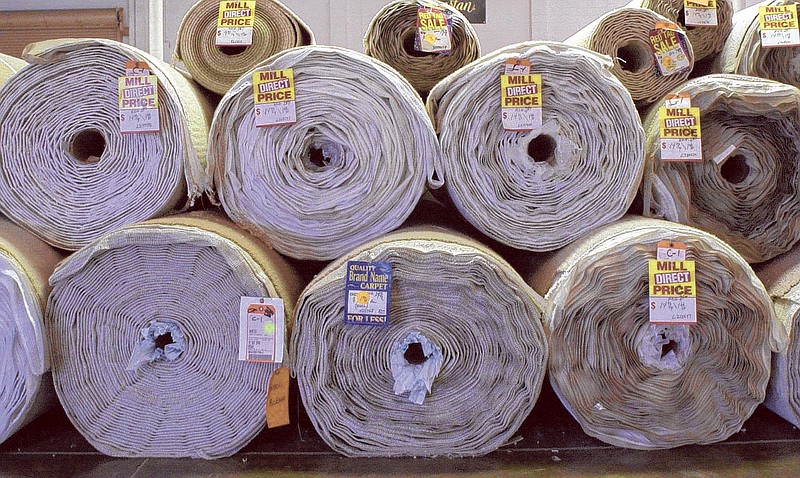A second Alabama city water supplier has sued a slew of Dalton carpet manufacturers, claiming they discharged chemicals that can severely damage people's health.
The Water Works and Sewer Board of the Town of Centre, Ala., filed the civil lawsuit against 35 companies in Cherokee County Circuit Court on May 15. An attorney for the water board argued that, despite well-known health risks, the companies still used chemicals to make their carpets resistant to stains and water.
Those chemicals, PFOA and PFOS, have been linked to diseased livers, damaged kidneys and altered puberty in studies on monkeys, rats and mice. According to the Environmental Protection Agency, past studies have shown "Suggestive Evidence" that the chemicals can also cause kidney and testicular cancer.
As a result, in May 2016 the EPA released a health advisory stating the supply of the chemicals in water should not be greater than 70 parts per trillion. That is a tiny amount, equivalent to about 70 square inches out of 250 square miles.
But over the past year, according to the lawsuit, Centre's water supply has consistently been above that rate, forcing the water board to purchase supply from Cherokee County's Water Authority. Rhon Jones, who represents Centre's Water Works and Sewer Board, blames the carpet and textile manufacturing industry in North Georgia.
First, his lawsuit names 3M Co., a manufacturer based in St. Paul, Minn., that manufactures the chemicals. He also sued companies that supply the chemicals and some local manufacturers, such as Shaw Industries and Mohawk Industries.
In the lawsuit, Jones wrote that companies discharge water that is high in PFOA and PFOS. Then, Dalton Utilities treats the water and pumps it to Loopers Bend Wastewater Treatment Plant, a 9,200-acre land application sewage treatment facility. At Loopers Bend, the water is sprinkled over land, allowing dirt and plants to naturally clean the water.
The Conasauga River runs through the area, picking up some of this water. The river runs to the Coosa River basin in Alabama, where the water board in Centre draws it and sells it to customers. But Jones said the chemicals coming out of the plants in Dalton at the beginning of this process have contaminated the water.
"There is no known environmental degradation for these chemicals," he wrote. "They are readily absorbed into biota and have a tendency to accumulate (at Loopers Bend)."
On May 23, Alabama State Toxicologist Dr. John Guarisco warned Centre's pregnant women, breastfeeding mothers and formula-fed infants to find alternative sources of drinking water.
This is Jones' second case against the carpet manufacturers. In September, he filed a nearly identical lawsuit on behalf of Gadsden, a city about 25 miles southeast of Centre. That case is now pending in the Alabama northern circuit of the U.S. District Court.
Prominent companies named in that lawsuit have not publicly commented on the case, but in court filings their lawyers have denied responsibility. 3M Co., the group that manufactures the actual chemicals, said it should not be held responsible for any other companies dumping those chemicals.
"It is, therefore, the manufacturers operating in the area in question that [Gadsden's water authority] claims are responsible for any alleged discharge - not 3M," Birmingham attorney William Cox wrote on Nov. 2.
An attorney for Mohawk, meanwhile, wrote that the Calhoun, Ga.,-based company said it did nothing that would cause damage to Gadsden's water supply. And an attorney for Shaw Industries in Dalton said the company does not use PFOA or PFOS. It uses other chemicals, the lawyer said, but not at a level that would harm people.
"Shaw was not the actual cause, or the proximate cause, of any alleged damages," attorney Alfred Smith wrote on Nov. 1.
After Centre filed its own lawsuit two weeks ago, officials for Dalton Utilities told the Dalton Daily Citizen that tests have turned up no PFOS or PFOA in its drinking water or in treated samples. A spokeswoman for the utility company did not return multiple calls or an email seeking comment Wednesday.
In 2009, according to the EPA, Dalton Utilities did find a significant amount of the chemicals at Loopers Bend. In compost, soil and sewage sludge, researchers found the chemicals at levels thousands of times higher than the current EPA health advisory.
In the Conasauga River running past Loopers Bend, according to the EPA, researchers found no detection in some samples. But in others, they found chemical contents of up to 5,200 parts per trillion - 74 times that of the EPA's health advisory.
According to a release from the EPA at the time, corporations were already phasing out the use of those chemicals. In 2006, eight major carpet manufacturing companies joined a stewardship program, with the goal to completely eliminate those chemicals by 2015.
Contact Staff Writer Tyler Jett at 423-757-6476 or tjett@timesfreepress.com. Follow him on Twitter @LetsJett.
